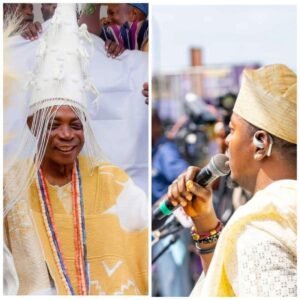Yoruba kings as kidnappers’ supper- By Festus Adedayo

(Published by the Sunday Tribune, February 4, 2024)
The porcupine is a large rodent that is clothed with a thick coat of sharp quills, spines. The spines protect it from rampaging predators. When it feels threatened, the porcupine shoots the arrows of its spines at its assailants. These deadly quills pierce the intending attacker, allowing the animal to escape harm. So, in their confidence about the mystical powers at the beck and call of their kings, Yoruba say that when hunters talk about pursuing, capturing and gripping an animal to death with bare hands, that animal can never be a porcupine. Most likely premising their conviction on history and ancient practices, the people liken their traditional rulers to the porcupine and believe that the monarchy approximates its gallantry.
In the same way, wherever they expect gallantry and bravery but find cowardice and effeminacy, Yoruba respond with a feeling of disgust. One of their responses is captured in a saying that goes thus, “A Save Our Soul shout of ‘help! Help!’ is a belittling cry that should never be heard from the mouth of an elderly; a hunter must never be found lamenting his pursuit by an animal.” In Yorubaland, age and hunting expeditions go hand in hand with bravery. So, they say, when you attain adulthood but are bereft of the paraphernalia of your age, you are as vulnerable, open to attacks and insults as a toddler. This, they express as “b’a o ni nkan agba, bi ewe laa ri.”
In Ekiti State last week, ferocious hunters laying siege to their own kind of games pounced on their hapless porcupine victims, regardless of its perceived sharp quills and spines. They consequently roasted the animal for supper. As a clear marker of resurgence of kidnapping in the southwest of Nigeria, on Monday last week, a group of daredevil gunmen ambushed and killed two traditional rulers – the Onimojo of Imojo, Oba Olatunde Olusola and the Elesun of Esun Ekiti, Oba Babatunde Ogunsakin. The third king, the Alara of Ara Ekiti, Oba Adebayo Fatoba, narrowly escaped with his life. He had been ambushed alongside the deceased monarchs. When the rodent – pardon me, the Alara – found an opening from the ferocious attacks of the kidnappers, he ran like a common grass-cutter fleeing a bloodthirsty trap. Providence had helped him escape.
Try to draw a mental imagery of that scene. You will have a sketched picture of Kabiyesi doing a Tobi Amusan in a 100 meter dash. His agbada flung hither thither, those unroyal apparels dancing a spirited Kiss Daniel Buga track on his body, Kabiyesi was probably reciting verses of the Psalm, The Lord is my Shepherd, as he sped towards the embrace of the forest, his ears fluffing like a hare’s ears. Just imagine how the insignia of his monarchy, the beaded crown, must have spun off his head in sissy surrender as Kabiyesi sprinted towards an escape route.
The dramatic scene was followed, a few days after, by the killing of a retired senior military officer, the Olukoro of Ikoro, in Kwara State, Oba Aremu-Cole. He was shot dead last Thursday night by assailants. They had invaded his palace and whisked away his wife and two others.
Scholarly articles have tried to articulate why Yoruba revere their monarchs and probably why those monarchs have today lost those regards and respect. Reverences for royalties are centuries old. Not only were monarchs likened to deputies of the gods, mystical and spiritual prowess were attributed to them. It was believed that no matter how genteel and meek you may be, pre-ascent into the stool of your forefathers, the moment you enter the monarchical coven called Ipebi for spiritual invigoration, you transcended the ordinariness of a mortal. Even if the Kabiyesi is as “jogolob” – brief in stature – as the soup of the Tapa, apologies to Ilorin musician, Odolaye Aremu, he is immediately invested with the prowess of a giant. God bless his soul, those days when I entered the ancient Oyo palace to confer with Iku Baba Yeye, Alaafin of Oyo, Oba Lamidi Adeyemi, a sudden fearfulness clambered up me, irrespective of our father-son relationship. If Oba Adeyemi then chose to meet you in that section of the palace that brimmed with age and power, you tended to hear ghosts and principalities whispering some unknown conversations in a spiritual tete-a-tete with a God-knows-who. When Kabiyesi eventually appeared in his “jogolo” stature, you did not see Lamidi. His face almost like the clone of a lion’s, you saw the dominance of the stature of his imperial powers.
The powers of kings were so venerated that their subjects feared them. That is why it was counseled that, you may maintain closeness with an Oba Alaye – the king who owns this world – but if that affinity spans seven meters length, in another breath, be far away from him by six meters breadth – Sun m’Oba niwon egbeje, jinna s’Oba niwon egbefa. This is because whoever is close to the king gets his anger.
So much hoopla that spans centuries has been made about the rituals of Yoruba kingship. Obas were seen as representatives of their people’s religion. Those religions have pantheon of deities and ancient cults. The Obas were representatives of Sango, Obatala, Orunmila and other gods. They must propitiate at the Sanponna (god of small pox) shrines and were de-facto priests of Oro cult. Myths were woven round Yoruba kingship so as to concretize and underscore their true answering to the cognomen of second in command to the gods. One of these myths is that kings do not eat in the public and, second, they do not see corpses. In Oyo for instance, you must remove your shoes before entering the palace. These myths all help to carve out the king as, though sharing perishable human body with mortal man, but is miles apart from the errant association with the flesh. Today, kings drink beer in public glare and eat like gluttons.
The ease with which Obas “open calabash” – commit what is called honorific suicide – in traditional Yoruba society also added verve to their perception as men of honour. In old Oyo kingdom, according to Samuel Johnson, Obas were forced to open calabash whenever they were perceived as having sunk into ignominy. The Oyomesi (chiefs) could reject a ruling Alaafin if he was seen to be tyrannical, wicked, or is embroiled in political intrigues or power struggles that unsettled the kingdom. The Basorun (head of the chiefs) communicated the rejection to him by presenting the Alaafin with an empty calabash. In some other cases, the calabash is stuffed with parrot eggs, followed by the pronouncements, “the gods reject you, the earth rejects you, the people reject you.”
In Olufunke Adeboye’s “Iku Ya J’esin”: Politically Motivated Suicide, Social Honor, and Chieftaincy Politics in Early Colonial Ibadan, (Canadian Journal of African Studies, 2007, Vol. 41, No. 2 (2007), pp. 189-225) we …









